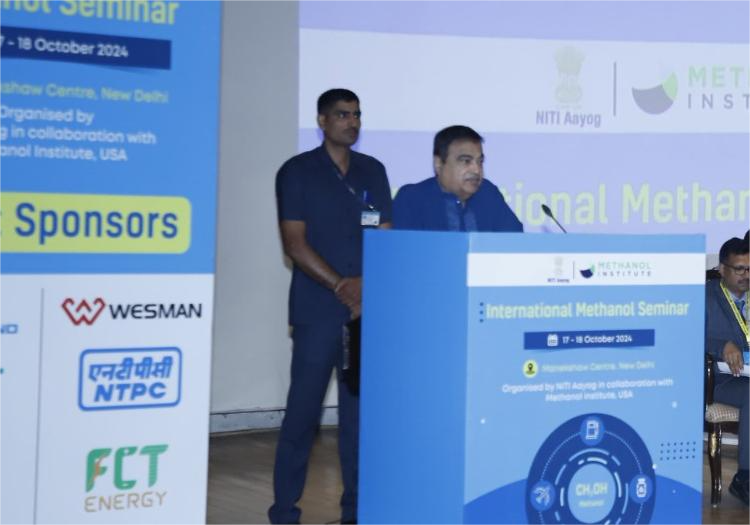Nitin Gadkari Highlights Biofuels as Key to Reducing Fossil Fuel Imports and Pollution
The expo showcased a variety of methanol-based products and technologies aimed at addressing critical energy challenges.

- Country:
- India
Union Minister for Road Transport & Highways, Shri Nitin Gadkari, inaugurated the International Methanol Seminar and Expo organized by NITI Aayog in New Delhi today. The event also featured Shri Suman Bery, Vice Chairman of NITI Aayog, Shri V K Saraswat, Member of NITI Aayog, and Shri Ajay Kumar Sood, Principal Scientific Advisor to the Government of India. The expo showcased a variety of methanol-based products and technologies aimed at addressing critical energy challenges.
Key Focus: Reducing Pollution and Fossil Fuel Imports
During his address, Shri Gadkari highlighted two of India's most pressing challenges: rising levels of pollution and the country's heavy reliance on fossil fuel imports, which total around ₹22 lakh crore annually. He stressed the importance of moving towards energy self-sufficiency, especially given the ongoing global geopolitical uncertainties. Shri Gadkari emphasized the role of biofuels such as methanol, ethanol, and bio-CNG in reducing dependence on fossil fuels, decreasing logistics costs, and improving the prosperity of Indian farmers.
Progress in Methanol Production
Shri Gadkari noted India's significant strides in the biofuel sector, particularly in methanol production. He applauded NITI Aayog for its successful initiatives to promote methanol as an affordable and environmentally friendly alternative to traditional fuels. He added that low-quality coal available in some Indian states is being used effectively to produce methanol, contributing to the nation's energy diversification.
Waste-to-Wealth Initiatives
The Union Minister also discussed India's ongoing efforts to convert waste into wealth by utilizing materials such as used tyre powder and plastic in road construction. This practice not only reduces the need for bitumen imports but also helps manage waste more sustainably.
He highlighted the success of waste-to-energy technologies, specifically focusing on the production of bio-CNG from rice straw. Shri Gadkari mentioned that there are 475 ongoing projects, with over 40 operational in states like Punjab, Haryana, Western Uttar Pradesh, and Karnataka. The ratio of rice straw to bio-CNG conversion is approximately 5:1, helping to provide a solution to the issue of stubble burning.
Addressing the Stubble Burning Issue
Shri Gadkari discussed the significant air pollution caused by stubble burning in states such as Punjab and Haryana. He stated that with proper planning, India could process a larger portion of the Parali (crop residue), reducing seasonal pollution by turning this waste into alternative fuels. He urged for more research into efficient biomass sources and cost-effective transportation methods to scale up the use of biomass in energy production.
Vision for India's Energy Future
The Union Minister emphasized that India's energy policies should be cost-effective, indigenous, and employment-generating, focusing on reducing pollution and fossil fuel imports. Shri Gadkari expressed confidence in biofuels as the way forward, both to strengthen India’s energy independence and to promote sustainable development.
Recognition for NITI AayogIn conclusion, Shri Gadkari appreciated NITI Aayog for organizing the International Seminar and Expo on Methanol and for its continued efforts to promote alternative energy solutions. He reiterated the need for ongoing collaboration between stakeholders to ensure that India progresses toward its energy goals.
- READ MORE ON:
- Nitin Gadkari
- International Methanol Seminar and Expo
- NITI Aayog










